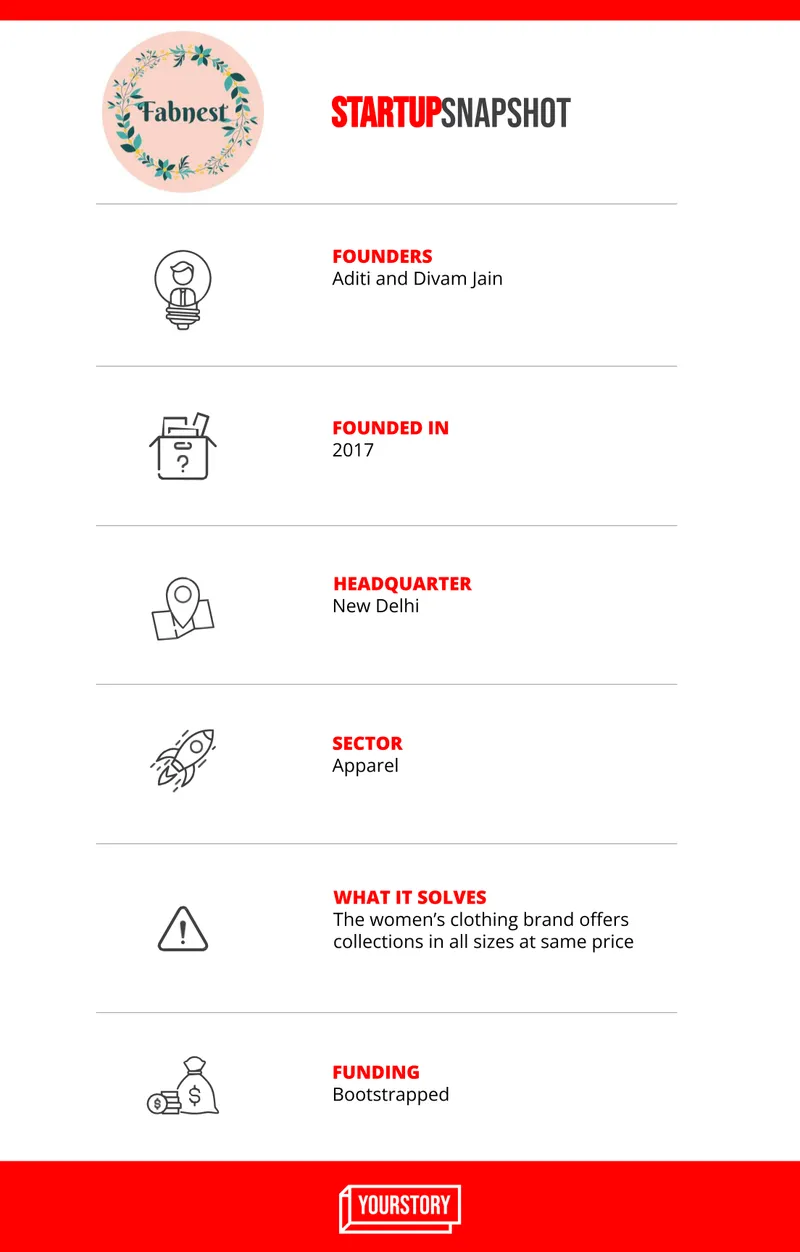This women’s clothing brand offers collections in all sizes at same price
New Delhi-based women’s clothing brand Fabnest offers something for everyone. The D2C startup plans to explore offline opportunities this year.
Ecommerce in India was still in a nascent stage when, in 2017, was launched with an investment of Rs 20 lakh. While many fashion brands were failing, the husband-wife duo — Aditi and Divam Jain — dared to launch the women's clothing company.
With experience in manufacturing and ecommerce, Divam dove into the already crowded space to understand and leverage the market opportunities and gaps. Moreover, with Aditi’s vast expertise in designing and product development, it seemed the right step to take.
“We have something for everyone. We have casual styles that resonate with a 20-year-old college student, in-vogue formal wear for a 30-year-old working woman, and elegant festive ensembles for a 50-year-old,” says Co-founder Aditi.
The homegrown direct-to-consumer (D2C) brand offers multiple categories, including ethnic, fusion, western, and lounge wear, to cater to the vast market. It also has a wide range of winter wear.

The uniqueness
“We noticed a big void in the industry. Either there were good quality high-priced brands or low quality low-priced brands. We wanted to introduce a brand with high-quality styles with affordable price points,” Aditi says.
Fabnest launches two to three collections every month. The startup sources its fabrics from various states, including Rajasthan, Andhra Pradesh, Bihar, Tamil Nadu, Uttar Pradesh, etc.
“We have multiple collections in solids, prints, laces, and we keep incorporating other methods to keep reinventing the brand, and keep the consumer engaged and looking forward to what's coming next,” Aditi says.
The New Delhi-headquartered startup outsources most of its production. However, it does the quality checks and packaging in-house to keep absolute control.
“The quality check is very vital. We train our partners in terms of our quality standards, but finally, our internal team takes complete responsibility,” she adds.
For each collection, the women's fashion brand creates designs for all sizes — from XS to 6XL (soon going up to 8 XL) — at the same price. It targets women in the age group of 20 to 55 years.
From a single-room office to a two-floor office now, Fabnest plans to launch its brick-and-mortar retail houses by 2022. The brand has a team of 15 members, of which nine are permanent members. About 25 percent of its staff are women.
“From working with limited choices of in-stock fabric to having exclusive prints, Fabnest has had quite some fruitful years,” she adds.
Sustainability is the key
Fabnest’s “mantra” to sustain and grow in the competitive women’s clothing market is to improvise around three key aspects — managing waste, focusing on Indian body type, and agile supply chain and minimising inventory.
“Since charity begins at home, we are using fabric waste from our facilities to make fabric buttons, middle layers of our three-layered masks, fabric bags, etc.,” Aditi says.
The brand also uses waste fabric to train orphans at NGOs to use this opportunity to earn livelihoods and become independent.
“Organisations like Earth Saviours have found our masks made from waste material extremely useful amid COVID-19,” Divam tells HerStory.
According to him, Fabnest has found an opportunity in sizes beyond 3XL. While many brands either only cater to the plus-size or petite, Fabnest has an expansive size range.
“Initially, we only had sizes till 2XL. But as we kept on getting requests for bigger sizes, we gauged market requirements and kept increasing the scope of our offerings,” he says.
Interestingly, Fabnest has come up with techniques to minimise and control stagnant inventory. Since consumers expect the products to reach them in 24-48 hours, this means a high risk of maintaining "ready to ship" inventory across all styles.
“To date, we have launched over 950 styles, and even if we have discontinued 30 percent of our old styles, imagine maintaining ready inventory for about 650 styles. Our agile supply chain and production model allows us to not have ready stock in all styles, yet to be able to ship out orders in 24-48 hours,” claims Divam.
He adds that factories working closely with the brand play a major role in implementing this technique.

The present and future
As per McKinsey & Co's FashionScope report, India's apparel market is expected to be valued at $59.3 billion in 2022.
“The fashion retail industry in India is highly saturated and extremely competitive. Entry benchmarks or hurdles to enter this industry are low, making it a super lucrative option,” Divam says.
However, the dynamics of this trade are evolving at a fast pace. One has to constantly innovate and keep consumers engaged by offering more products.
He adds, “We are focusing on new fabrics, silhouettes, techniques, and portals, and at the same time, we are also focusing on forecasting, technology, and data-driven product development. You have to think out of the box if you need to stay in the game and ace it.”
At present, the D2C bootstrapped startup retails through its website and selected platforms, including Nykaa Fashion, Myntra, Vajor, LBB, etc.
“We cater to clients in every single city in India and ship globally. We have delivered orders as far as Australia and New Zealand. We are also listed on a couple of platforms in the Middle East, and the responses are brilliant,” says Divam.
In 2020, Fabnest became a profitable company and surpassed last year's closing revenue in December end. It expects to close this financial year with a revenue of Rs 5 crore.
“While D2C will be our primary focus, we also plan to launch our first physical flagship store this year. Also, we plan to pitch to investors and take this to a whole new level. We will use the funds to get experienced and seasoned employees on board and invest in product innovation and technology,” Divam says.
Domestically, Fabnest competes with the likes of Aacho, Aks, Global Desi, W, Biba, FabIndia, Jaypore, etc. Its global competitors are H&M, Zara, and Forever New, among others.
Edited by Suman Singh






![[YS Learn] Key takeaways from Morgan Housel’s ‘The Psychology of Money’](https://images.yourstory.com/cs/2/11718bd02d6d11e9aa979329348d4c3e/Imagewf2p-1607509774638.jpg?mode=crop&crop=faces&ar=1%3A1&format=auto&w=1920&q=75)

